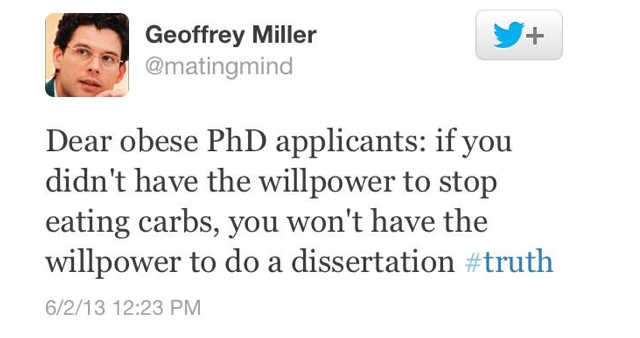“All tweets are my own.”
That’s the most dangerous thing you could ever say in social media. I see it in social bio’s all the time. Heck, a lot of companies make it a policy that if you’re going to be on social media, you must use a disclaimer so that everybody knows whatever you say is not official word from “the” corporation. Like, you taking a pic of your chicken noodle soup isn’t endorsed by Acme Corp.
“All tweets are my own and not a reflection of my employer.”
Companies have handled this all wrong. Your employees are a reflection of your company. End of story.
As an example, look what was tweeted a few days ago:
Since he added the #truth hashtag, he is really wanting you to know that this is so true!
Your first reaction is “Who is this jackass?” so you go and look at his bio:
After you get over the awesome irony that he’s a psych prof, you now start to question the PhD selection process at NYU and U New Mexico. Right?
Then he starts getting some slack and starts the process the Internet Geekalanche Recovery:
Step 1: Initial half-ass apology:
“Obviously”
As you can see, it’s going over smashingly well with the audience.
Step 2: The “Oh crap, this is really taking off” apology
Realize that upsetting geeks, obese people or anyone that isn’t a Prof at NYU named Miller, he tries:
Wait what? He used the #truth tag?!?!?!!?! Is there no integrity in the #truth tag anymore?!??!
I’ve translated this tweet for you: “My sincere apologies to my boss, who is now reading this thing that they refer to as “Tweezer”. It does reflect my true views, values and standards. That’s why I used the #truth tag baby!”
Step 3: SHUT IT DOWN!!!! SHUT IT DOWN!!!! He makes his account private, since the #truth hurts.
Step 4: Blame hackers/virus/research
Usually saved for mis-sent pictures of a person’s crotch, people run to the “I WAS HACKED! ZOMG!” when they’re put in the corner. Professor Miller takes a new route of the scapegoat Step 4, and says it was “for research”!
“He told her that his comment on Twitter was part of a research project. We are looking into the validity of this assertion.”
Read the full fall-out article here (and thanks to my man Steve for giving me the heads-up on all of this)
Step 5: Start a private research lab to discuss the consequences of telling obese people they have no will-power.
Ok, still waiting on Step 5, but you get the point.
Now, the entire point of all the previous roller-coaster is to ask you this question:
If he had a disclaimer in his bio “All tweets are my own.” would that have changed any of this?
Not one bit.
Those employee disclaimers hurt more than they help actually, since it gives people the false sense of freedom of social media speech.
If you disclose where you work, you’re wearing that name badge 24/7 online. Even if you don’t disclose, you’re just a LinkedIn search away from being outed.
If you’re going to make employees put a disclaimer in their bio, make it this:
“All tweets are my own and a proud reflection of my employer, because we are the brand.”





